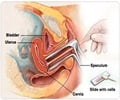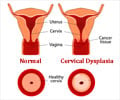Screening for cervical and breast cancers were found to be very low among Indonesian women and only one in five women are aware of cervical cancer screening,

‘Early screening of cervical cancer and breast cancer can lead to better treatment, which improves patient's survival and quality of life.’





"Early detection of cervical and breast cancers leads to better treatment, with improved survival and quality of life," said lead author Dr Sumadi Lukman Anwar, oncologist in training, Gadjah Mada University and Dr. Sardjito General Hospital, Yogyakarta, Indonesia."In Indonesia, many patients are diagnosed with breast and cervical cancers at a very late stage when there are limited options for curative treatment," he continued. "To improve early detection we need to know levels of awareness and participation in screening programmes, and what factors influence these levels."
Since 2015, all women in Indonesia aged 40 and above are eligible for cervical and breast cancer screening in primary healthcare funded by the Indonesian Ministry of Health (PERMENKES No.15/2015). Cervical smears are performed yearly for two years, then every five years if no abnormalities are found (otherwise they continue yearly). Clinical breast examinations are performed yearly and women are referred for sonography or mammography if there are any lumps or other signs of breast cancer. Women do not receive a letter inviting them to attend screening; in most cases they use their own initiative and ask for an appointment in primary healthcare.
The researchers assessed levels of awareness and participation in screening programmes for cervical and breast cancers. They also investigated factors that might influence these levels. The study used data from the Indonesian Family Life Survey (IFLS) which includes more than 30,000 individuals. (2) The first survey in 1993 was representative of 83% of the Indonesian population living in 13 of the 27 provinces in the country.
The current study is a collaborative work led by PILAR Research and Education and Gadjah Mada University and involves researchers from University College London, King's College London and University of Manchester. The analysis included 5,397 women aged 40 and older with no history of cancer who took part in the fifth IFLS survey, conducted in 2014 and 2015.
Advertisement
The researchers calculated the levels of awareness and participation in screening, and whether they varied by any of the population characteristics. Only 1,058 (20%) of women were aware of cervical smears. Of those who were aware, only 297 women had ever had a cervical smear performed. Just 251 (5%) of women were aware of mammography and of those, only five women had received a mammogram in the previous year. Some 12% of women had done breast self-examination in the past year.
Advertisement
Anwar said: "We found very low levels of awareness of screening programmes for cervical and breast cancers in Indonesian women, and participation was even lower with indications of a social gradient. Health practitioners need to be aware of subgroups of women at risk who may benefit from improved information and communication concerning the availability of cancer screening. If further research supports the role of social participation, a campaign may be needed that is socially and culturally adapted for women in Indonesia and communicated using existing community networks and media they frequently use. Most people own mobile phones so the potential use of social media could also be explored."
Dr Wen-son Hsieh, Medical Oncologist, ICON-SOC and Farrer Park Hospital, Singapore said: "Cervical cancer is the 4th most common cancer in women worldwide and 8% of the cases occur in the developing world. This is at least partly due to the low incidence of screening procedures being performed in the developing world."
"The results of this study reinforce the concept that cancer screening programs can improve cancer screening rates in two ways: provide education resulting in improved awareness of the benefits of cancer screening and provide access to resources and facilities to allow cancer screening to occur."
Commenting on the study, Jonathan Ledermann, Professor of Medical Oncology, UCL Cancer Institute, London, UK, said: "The rates of awareness and uptake of screening for cervical and breast cancer found in this Indonesian study were extremely low compared to Western Europe where we would expect a 70% uptake. A better understanding is needed as to why these rates are so low."
"The clear message is that education about screening is not well disseminated amongst the population and uptake is even lower," he continued. "So there's a lot of work to be done, and a lot of investment that needs to be made in education and facilities for screening if Indonesia is going to climb up the ladder of screening for those two cancers."
Source-Eurekalert













